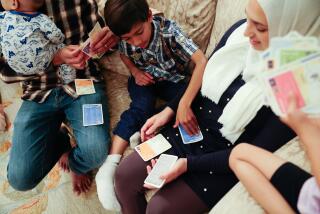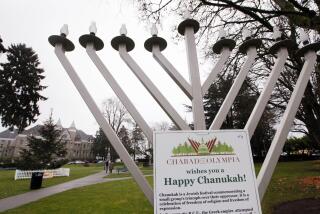It’s most gratifying to give these people a little Jewishness.
- Share via
Howard Peter Simon credits a move to his grandfather’s home caused by World War I for his strong religious convictions. He was forced out of Germany by World War II and ended up fighting in the British army and marrying a fellow refugee in England. Simon and his wife, Fritzl, live in North Hollywood.
I was born on the 22nd of January, 1908, in Bad Duerkheim, Germany. In World War I my father was called up into the army and my mother was expecting No. 4, so I was sent to my grandfather in a small town called Laupheim. In Laupheim there was a Jewish grade school. I learned a lot of customs related to Jewish affairs. On Saturday, most of the shops closed and everybody went to the synagogue like in olden times. For Passover, the little boys and girls collected wood, which we took to the Jewish mountain that is behind the cemetery. For the Sukkot festival, I made chains of chestnuts.
When I was 7 years old, we had a Hanukkah play. I remember very well, I was on stage and I played a little boy supposedly doing my homework when I dozed off on my desk. Before me came the story of Hanukkah, the Maccabees fighting, then finding the last can of oil, the miracle of the seven days.
My grandfather was a free spirit. He wasn’t very Orthodox or even very Jewish-minded, but it didn’t reflect on me. I saw something different. I was always in the Jewish school. I was always together with the other children on Friday night and Saturday at the synagogue. My grandfather was not the influence, but I think the town and the surroundings were.
When I was 25, I was clerking in the administrative office before my final exam to become a lawyer when I got a letter saying, “Because you’re a Jew, you are dismissed from the service.” That was in 1933. I went to France for a year and a half. It was very grim. Most of my family was leaving, some to America.
I emigrated to England in 1935. When the war broke out, I joined the Pioneer Corps, a branch of the British Army which consisted mostly of refugees and displaced persons. We were part of the British expeditionary force sent to Le Havre, France, in 1940. We moved from Le Havre to the inland of France and supplied the forward lines with what they needed. One afternoon we were called in and told to pack up and leave everything behind except what we were wearing. Lorries came and moved us to a port and we were put on a ship. Arriving in England, we saw in the paper that France had capitulated.
The only thing we could feel was hope that everything would turn out all right. America wasn’t in the war, but England never doubted that they would prevail. They were a very tough people.
After the war, I married, and my wife and I decided to come to the United States. I wasn’t too involved in Jewish affairs because in California you have to work a lot to make ends meet with three children and my wife. But we observed all the holidays and went to the synagogue as often as we could with the children.
You should give them that background. As they get older they form their own ideas and then will probably change to what they believe. Or they may not change. It can go both ways, can it not? You have to leave it to them.
My wife sang in the choir for many years. Five years ago, she was asked to visit convalescent hospitals to give services to the Jewish residents once a month. They asked me when I retired to join them. We go to two convalescent hospitals once a month and give the Jewish service, and we sing Hebrew songs and good oldies, which they like. It’s also very strange--they call me the rabbi. I guess it’s because I’m the only man amongst the ladies who come there and I say the prayers.
It’s most gratifying to give these people a little Jewishness in the evening of their lives. Some of the patients only come out of their rooms when they know we are coming for the service. They are reminded of old Yiddish songs in little towns in Poland.


